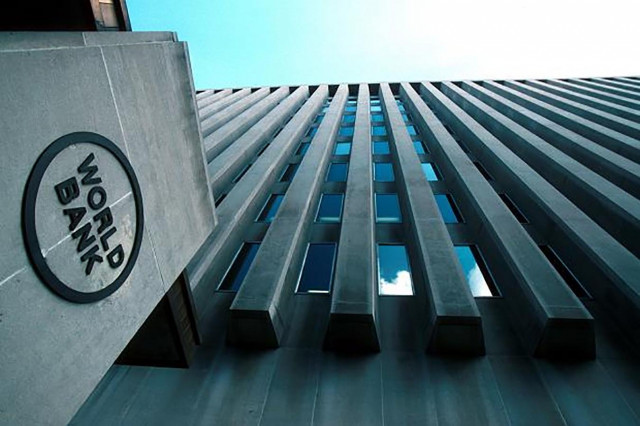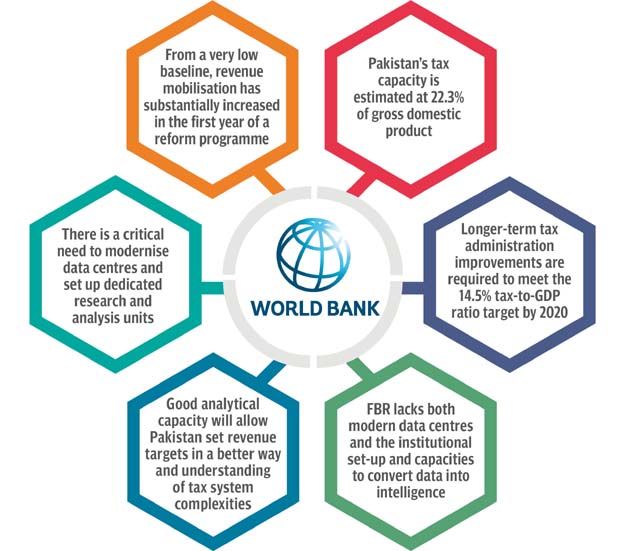Pakistan still sustains tax losses worth Rs3.2tr
There is some improvement though, which is the result of new tax policy measures

PHOTO: REUTERS
Pakistan’s tax capacity is estimated at 22.3% of gross domestic product (GDP) - the total size of national economy, according to the report. At the current market price, this translates into Rs7.2 trillion.
World Bank concerned about debt sustainability
However, the country’s projected tax-to-GDP ratio is 12.5% or Rs3.9 trillion for fiscal year 2016-17, ending this Friday. This implies a tax gap of 9.8% of GDP or Rs3.2 trillion.
The size of tax gap is directly related to the extent of tax evasion in the country.
The new estimated gap is lower than the previous projection when the tax-to-GDP ratio was around 11.5%. However, the entire improvement came as a result of new tax policy measures as the Federal Board of Revenue (FBR) is still struggling to improve its administration.
The World Bank prepared the brief report recently for the approval of a $5-million project called “Mobilise Domestic Revenues by Strengthening Tax Systems as Development Tools and Building Tax Policy Analysis Capacity”. The money is being provided by the Department for International Development of the United Kingdom in grant to Pakistan through the World Bank.
The bank said revenue mobilisation, from a very low baseline, had substantially increased in the first year of a reform programme. The tax-to-GDP ratio has steadily risen from the 2013-14 baseline of 10.5% to 12.4% in 2015-16.
“While this progress is encouraging, Pakistan’s tax capacity is estimated at 22.3% of GDP,” it added.

Independent economists, however, believe that the tax capacity of 22.3% is too high for a country like Pakistan. “This estimate is absurd, if the government tries to achieve this, it will kill the local industry,” said former finance minister Dr Hafiz Pasha.
He said another study carried out in cooperation with Adam Smith International put Pakistan’s tax capacity at less than 17%. This means the tax gap is 4.5% of GDP or Rs1.4 trillion.
Special Assistant to the Prime Minister on Revenue Haroon Akhtar Khan expressed the hope last week that Pakistan would achieve 12.5% tax-to-GDP ratio by the end of current fiscal year.
He emphasised that all the policy measures taken over the past four years did not yield desired results. Major revenue flows came from higher rates for non-compliant people and withdrawal of tax concessions, said Khan.
It seems that the biggest problem is weak enforcement. In Pakistan, 4.2 million are registered National Tax Number (NTN) holders, but only 1.23 million file tax returns. The FBR could not do anything about the 2.97 million people who are not filing the returns. Similarly, against the 192,000 people registered with the sales tax department, only 119,000 filed their returns.
The World Bank report underlined that in order to sustain gains of past years and close the tax gap, longer-term improvements in tax administration were required to meet the 14.5% tax-to-GDP ratio target by 2020.
The World Bank’s $5-million initiative is aimed at enhancing information management systems, setting up a tax intelligence unit and a market monitoring and intervention unit and preparing analytical reports on a regular basis for decision-making.
Pakistan’s economy is struggling to recover slowly from a low-investment, low-growth trap. This has been caused by a weak external position and a consistently weak fiscal position, stemming largely from poor revenue mobilisation.
World Bank to finance solar power projects in Pakistan
The new programme has been based on lessons learnt from the 2005-11 Tax Administrative Reform Project (Tarp), which is considered one of the most unsuccessful World Bank-funded projects in Pakistan.
The bank said the success of Tarp was restricted by inadequate technical assistance, a limited local presence and low prioritisation of tax policy reforms.
It added the new programme “Multi-donor Trust Fund for Accelerating Growth and Reforms” (TAGR) had provided on-demand technical assistance at the federal and provincial levels, a significant local presence and availability of result-based lending instruments.
The bank believes that a good analytical capacity will allow Pakistan establish revenue targets in a better way, improved understanding of loopholes and tax fraud patterns and better understanding of tax system complexities.
It said the existing FBR infrastructure purchased with the last Tarp project, which was completed in 2010, was out-dated and unable to meet growing demand.
Despite the strategic importance of data and analysis, the FBR lacks both modern data centres and the institutional set-up and capacities to convert data into intelligence, according to the report.
As such, there is a critical need to modernise data centres and set up dedicated research and analysis units for performing analytical studies on revenue forecasting, compliance gaps, compliance and administrative costs and the impact of tax policies.
Published in The Express Tribune, June 29th, 2017.
Like Business on Facebook, follow @TribuneBiz on Twitter to stay informed and join in the conversation.



















COMMENTS
Comments are moderated and generally will be posted if they are on-topic and not abusive.
For more information, please see our Comments FAQ